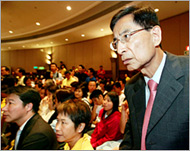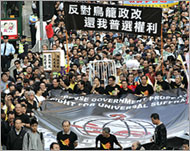Hong Kong rejects limited democracy
Hong Kong’s pro-democracy legislators have sent a blunt message to Beijing by vetoing a political reform plan that lacked a timetable for when the Chinese territory will become fully democratic.

Will China’s Communist leaders now rethink the proposed reforms that the lawmakers rejected on Wednesday? Will they speed up democratisation in the former British colony, which returned to Chinese rule in 1997?
Analysts and lawmakers are doubtful. Some predict the legislators’ move will likely deepen Beijing’s distrust of the pro-democracy lawmakers – who have been labelled traitors or unpatriotic.
Since returning to Chinese rule, Hong Kong has been run under a “one country, two systems” formula that promises to give the city a wide autonomy.
Hong Kong’s government proposed the political reforms, but such a touchy issue still requires Beijing’s blessings.
The proposed changes called for expanding the legislature by 10 seats and doubling the size of an 800-member committee that picks Hong Kong’s leader.
Best deal
Some 34 legislators voted for it, 24 were opposed and one abstained.
“I will not vote for this, it is against the (constitution),” said lawmaker Martin Lee, the figurehead for Hong Kong’s pro-democracy movement.
 |
|
Martin Lee is the figurehead of |
The government said it was the best deal it could offer until Hong Kong’s public could reach a consensus on how it would become fully democratic. Until that happens, the gradual approach is best, the government and pro-Beijing lawmakers said.
But pro-democracy lawmakers refused to settle for a reform package that did not include a clear timetable for complete democracy. They argued that Hong Kong’s well-educated, stable and affluent society was ready to choose its leaders long ago and should not have to wait any longer.
Anthony Cheung, a public administration professor at City University of Hong Kong, said Beijing won’t be ready to relax its grip on Hong Kong soon.
“What Beijing is concerned about is that once you have universal suffrage, Beijing expects the democrats to win the election. But Beijing is not reassured that the democrats would be Beijing-friendly,” said Cheung, a member of the cabinet of Donald Tsang, Hong Kong’s chief executive.
Patriotism needed
Cheung said the pro-democracy lawmakers have to prove that they are patriotic so that Beijing can stop worrying about them. But he said Wednesday’s rejection of the political reforms could inflame Beijing’s suspicions.
As the lawmakers debated the reforms, many argued that rejecting them should not call into question their patriotism.
“We love our country. We want to have a unified China,” Cheung Man-kwong, a legislator, said.
 |
|
Democracy activists want a lot |
“We want to have democracy in Hong Kong, but it doesn’t mean we’ll be blindly following others’ orders. We are willing and have the courage to speak the truth. The rulers of China need people who are courageous and speak the truth.”
But Joseph Cheng, a political science professor at City University of Hong Kong, expressed doubt that China’s leadership was genuinely interested in meaningful political reform in Hong Kong.
“In order to have democracy in Hong Kong, you have to have democracy in China first,” Cheng said.
“The Chinese leadership has no intention of weakening its monopoly on political power. The leadership simply does not believe that democratisation is an option at the moment.”